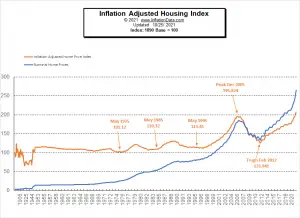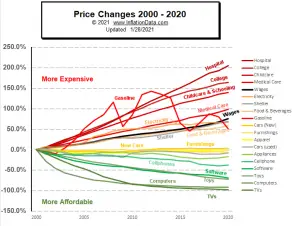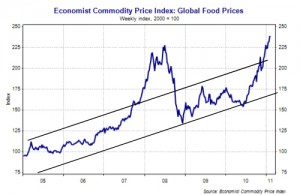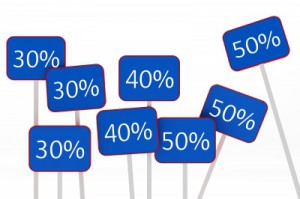There is a common belief that a company can arbitrarily pick any price it wants for its products and then make obscene profits. And while it is true that a company is certainly free to set its prices, that doesn’t mean that consumers have to pay them. There are a variety of other factors at play. Does the company have a monopoly? How long would it take for the competition to gear up and start producing a competing product? How much demand is there for this product? How desperately does the consumer want/need this product? How expensive is it for the competition to get started? Is the monopoly due to a patent, government fiat, or temporary supply disruption? And many others. In the … [Read more...]
Inflation Takes a Bite Out of Your Food Budget
The Bureau of Labor Statistics reported that in May 2022, Annual Inflation Rose. May Food Inflation Breaks Record: The combined food index (at home and away) increased 10.1 percent for the 12-months ending May, the first annual increase of 10 percent or more since the period ending March 1981. Food at home rose even more... 11.9% over the last 12 months... while food away from home "only" rose 7.4% over the last year. All six major grocery store food group indexes rose in May. The index for dairy and related products rose 2.9 percent, its largest monthly increase since July 2007. The index for nonalcoholic beverages increased 1.7 percent, and the index for other food at home rose … [Read more...]
Inflation Adjusted Gasoline Hits New High
June 10, 2022 Update: AAA says the national average is now almost $5.00 a gallon (and much higher in places like California). That moves the blue dot on the chart below up and prices are now well above inflation-adjusted peaks! June 2, 2022 It's no secret that gasoline prices are skyrocketing. However, a couple of months ago we said that although gas prices were high and rising, they still weren't at record levels when looked at in inflation-adjusted terms. But all that has changed now as gasoline prices continue to climb upward. Today the AAA reported the highest national gas prices they have recorded. Although this is a significant development, all sorts of … [Read more...]
Do Housing Prices Always Go Up?
In the last few years, housing prices have skyrocketed, and investors are once again jumping on the housing bandwagon as an excellent way to make money. The same sentiment existed in the early 2000s as housing prices were rising rapidly then as well. These periods both created the impression that “housing prices always go up”. But is that actually true? If we look at the “nominal” prices of houses, i.e., the cost in dollars BEFORE adjusting for inflation, it does appear that housing prices go up fairly consistently. In the following chart, we see housing prices since 1890. The blue line is the nominal housing price, and we can see a very gradual increase up through the early 1970s. Prices … [Read more...]
Price and Wage Changes since 2000
When we think about price changes we often think of them in terms of the changes in the Consumer Price Index (CPI-U for all Urban Consumers). Looking at it that way, we may get the idea that price movements are monolithic i.e. that they all move together, so "prices" were up 2% or 5% or whatever, over the last 12 months. But that is a bit misleading since prices all move independently. For this reason, the U.S. Bureau of Labor Statistics publishes a CPI database with a breakdown of all the various components. By analyzing the various components of the CPI over the last 20 years we developed the following Chart. Click Chart for larger image As we can see … [Read more...]
U.K. Historical Price Converter Added
This month as a service for our friends in the U.K. we have added a U.K. Historical Price Converter. This handy little calculator will tell you the equivalent value of any prices from 1751 to the present. It is based on the "Retail Prices Index" which was instituted in Great Britain in 1947 in an effort to determine how much the war was affecting prices. The data was later "backdated" to include prices back to 1751 by Jim O’Donoghue, Louise Goulding, and Grahame Allen in a paper entitled ‘Consumer Price Inflation Since 1750’. In it they state that, their article presents: "a composite price index covering the period since 1750 which can be used for analysis of consumer price … [Read more...]
Agflation- What is it?
Agflation, is a relatively new term coined by analysts at Merrill Lynch in 2007. Back then rising demand for agricultural products started driving up prices. Agflation is simply a combining of the words agriculture as in "agricultural commodities" and the word inflation. Inflation is commonly used to mean an increase in prices (although it originally meant an increase in the money supply which eventually resulted in an increase in prices). So agflation is simply an increase in the prices of agricultural products. But agflation is not the result of an increase in the money supply like typical inflation, but rather it is simply a result of supply and demand factors. In 2000, the world wide … [Read more...]
Are Prices really in “Free Fall” ?
Falling Prices: A recent article in MoneyNews from NewsMax.com states “Consumer Prices in Free Fall- Consumer prices have not been this low since 1949”. The article went on to say “That's the conclusion of the US Labor Department, which reported Thursday that, thanks to lower gas prices, the Consumer Price Index fell by 0.6% in November.” First of all the index actually declined by .8%, it was .6% on a “Seasonally adjusted basis” and secondly nowhere in the report released by the Bureau of Labor Statistics (part of the US Labor Department) did they come to any conclusions about anything let alone “free falling” prices. What they did state is that the majority of the decline was … [Read more...]









